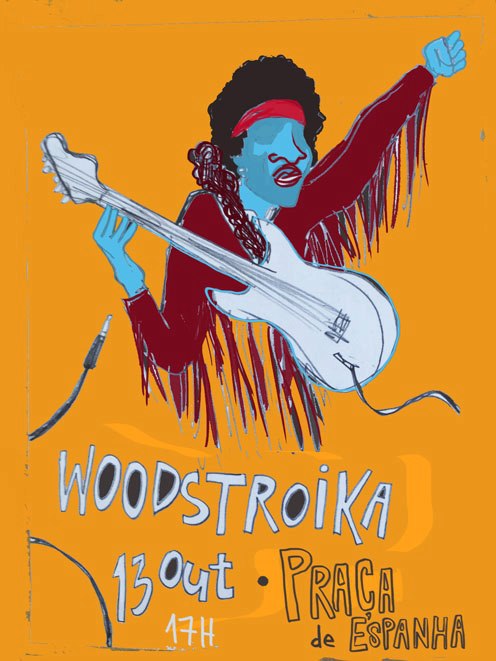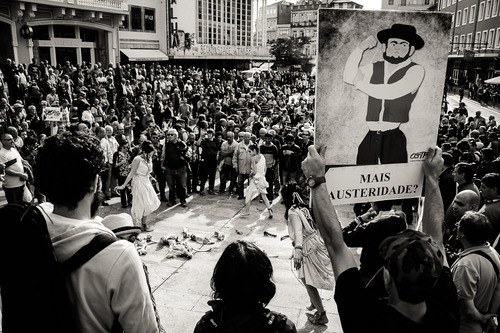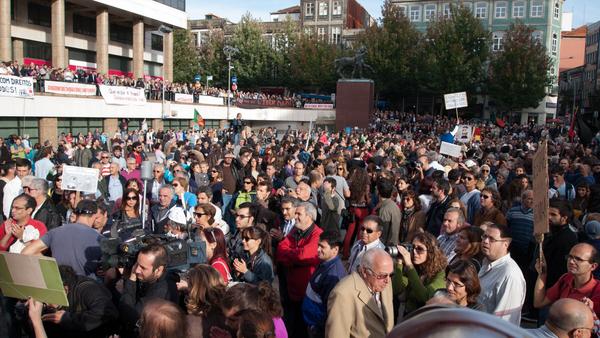This post is part of our coverage Europe in Crisis
On Saturday, October 13, 2012 once again the streets of several cities in Portugal were filled with the protests of its citizens, only this time, accompanying the voices of the protesters, there was ‘a global cacerolazo, casserole, potbanging protest’, as part of the Global Noise events simultaneously taking place worldwide.
In Portugal Global Noise [pt] protests became ‘culture is resistance’ with concerts in 14 cities, under the motto #QueSeLixeaTroika, following massive ‘Screw the Troika! We want our lives‘ protests on September 15.
The Facebook event calling for mobilization in Lisbon explains the idea behind the cultural manifestation [pt]:

Woodstroika October 13, Praça de Espanha, Lisbon. Poster by Pedro Vieira shared on the blog irmaolucia
Há nesta altura um aumento da percepção da grave situação em que se encontra o país, sendo cada vez mais evidente e urgente a necessidade de outras perspectivas. A cultura é imprescindível para a consciência de um povo, e é essa própria consciência que por sua vez cria e dá conteúdo à cultura. Os profissionais da cultura não são excepção à situação exasperante em que o país e o mundo se encontram actualmente: é imprescindível reagir, é impensável não o fazer. Do encontro de vontades nascido nas mais recentes mobilizações surgiu a ideia de uma expressão cultural, uma manifestação marcadamente baseada nas artes e no espectáculo para contestar a austeridade e os seus implementadores: governo e troika.
Currently there is growing awareness on the serious situation in which the country finds itself, the need for other perspectives is becoming increasingly evident and urgent. Culture is essential for the awareness of a people, and it is that awareness which in turn creates and provides content for culture. The culture professionals are no exception to the exasperating situation in which the country and the world are now: it is essential to react, it is unthinkable not to do it. From the meeting of wills born out of the most recent mobilizations, the idea of a cultural expression arises — a manifestation based on arts and performance, to challenge the austerity and its implementers: government and troika.
Praça de Espanha in Lisbon was full of people and red banners stated ‘What am I to do with this sword?’
In Porto, protesters concentrated in Praça da Batalha holding pots and pans in their hands, “a symbol of our protest, so that tomorrow's soup is not missing for anyone”, read the Facebook call [pt].

“More austerity?”, Praça da Batalha, Porto, October 13. Photo by Miguel Oliveira on Tumblr (used with permission)
The march went through one of the city's main traditional shopping streets, as recorded in a video by Ana Cristina Seabra, and ended in Praça D. João I, where the concerts were to take place [pt].
Tiago B.‘s video on Youtube illustrates the scene:
Nuno Fangueiro and RiseUP on Facebook, Miguel Oliveira and Nelson d'Aires on their blogs, and Pedro Ferreira on Demotix have photoreports.
In Coimbra the protesters held signs saying “Basta” (Enough) and “United for global change”.
Students’ Collective Aacção (Action) created a video with images from the protests in Coimbra:
The cities of Aveiro, Angra do Heroísmo, Barreiro, Beja, Braga, Caldas da Rainha, Faro, Loulé, Portimão, Setúbal, Viana do Castelo and Viseu, also brought people, culture and noise together to the streets. The video “A Cultura Contra a Troika” (Culture counteratroika, a play with words with counterattack) by queselixeatroika on YouTube sums up the mobilizations across the country and abroad:
Not everyone agreed with the format of the protests though, such as Luís Costa who left multiple appeals [pt] on Facebook “boycotting the subversion of what should be a demonstration”:
alguem pagou para transformar uma manifestação num festival! e aposto que somos nós que estamos a pagar por esta palhaçada! é mais fácil juntar meia duzia de artistas e po-los a cantar do que ter um povo revoltado às portas da assembleia a desafiar os polícias e pronto para partir aquilo tudo. é mais conveniente que ao final do dia o povo vá para casa a dizer “epá isto da austeridade até dá concertos à borla”.
someone paid to turn a protest into a festival! and I bet it is we who are paying for this bullshit! it is easier to join half a dozen artists and put them to sing than to have a rebellious people at the door of the parliament to challenge the police and ready to break it all. it is more convenient that at the end of the day the people go home to say “hey, this austerity thing even gives concerts for free”
Despite pessimistic views, discontent towards austerity measures and the government keeps gaining momentum. A “Siege to São Bento [Palace]” [pt], the home to the Assembly of the Republic, has been called for October 15. Similar to what happened in Spain, the initiative aims to gather those who refuse current policies that lead to more unemployment, poverty, and social regression.
The manifesto [pt] that came out of protests on October 13, call for growing resistance and pressure against the state budget for 2013, to be voted on in parliament on October 31:
Começando hoje, aqui, e passando por dia 31, estaremos na rua para dizer: “este orçamento não passará!”
Starting here, today, and passing through the 31st [of October], we will be on the streets to say: “this budget shall not pass!”.
This post is part of our coverage Europe in Crisis









